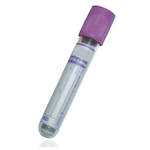Suitable Specimen Types
- EDTA Whole Blood
Specimen Transport
Samples can be delivered to the laboratory at room temperature (stable for 8 hours unspun).
Sample Processing in Laboratory
Samples should be centrifuged upon receipt and the separated plasma transferred to a labelled plastic tube, which should be stored at -20°C. Samples are stable for 8 hours unspun.
Sample Preparation
The sample should be collected into an EDTA tube (purple top).
Turnaround Time
5 daysSample Stability
Store plasma at -20oC
Adrenocorticotrophic Hormone (ACTH)
General Information
Adrenocorticotropic hormone (ACTH) is produced in the pituitary gland to stimulate secretion of cortisol by the adrenal glands. Normally, ACTH increases when cortisol is low and falls when cortisol is high. The concentration of ACTH varies greatly at different times of the day, with the highest amount at about 8 am and the lowest about midnight, therefore the sample will normally be collected first thing in the morning.
Secretion of ACTH may be increased by stress.
Some drugs and conditions can cause ACTH levels to rise, including amphetamines, insulin, levodopa, and metoclopramide.
Drugs that cause ACTH to fall include dexamethasone and other drugs that act like cortisol (including prednisone, hydrocortisone, prednisolone, and methylprednisolone), and megestrol acetate.
Patient Preparation
Ensure patient is not taking corticosteroids, synacthen and avoid undue stress. Take blood into EDTA tubes.
Notes
To diagnose adrenal and pituitary diseases such as Cushing's syndrome, Cushing's disease, Addison's disease, adrenal tumors, and pituitary tumors; usually done as a diagnostic test once an abnormal cortisol level is detected.
Reference Range
6 to 51 ng/L
Source of Reference Range
iDSSpecifications
- EQA Scheme?: Yes
-
EQA Status:
UKNEQAS scheme
